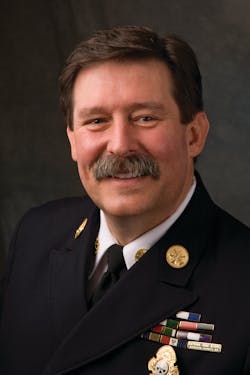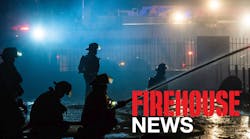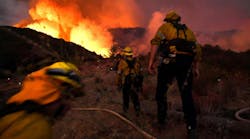Case Study 1: A firefighter drags his genitals across the forehead of a probationary firefighter as part of a hazing ritual. When the probie complains, he is retaliated against by those assigned to his station, including officers. It is not until a formal complaint is filed with HR that the department is forced to address the hazing in a formal way. The investigation drags on for months. Frustrated, the probie files a lawsuit and the allegations reach the media, prompting outrage from the public. The fire department leadership and firefighters are in disbelief at how a simple rookie hazing caused such a big deal. No one is terminated, and even the brief suspension of those involved is met with protest from other firefighters.
Case Study 2: A firefighter who recently angered her fire chief by complaining to an elected official about station conditions forwards a pro-police social media post sent by her brother who is a police officer. The fire chief says he received an anonymous complaint about the post and quickly terminates the firefighter for sharing what he concludes is a racially offensive post.
It is no secret that the fire service has historically struggled with discipline. The very concept of discipline is at odds with the sense that “we have each other’s back.” But the problem goes much deeper than the brotherhood.
Problems with a binary system
One of the characteristics of our traditional approach to discipline is that while we do not like to investigate our own, once a fire department’s leadership is convinced that a firefighter has engaged in serious misconduct, a boundary has been crossed. Serious misconduct warrants a prompt investigation and stern discipline. Like a detective on the trail of a murderer, once the investigation is underway, a case is built against the accused so that justice may be served.
The result is that when the department’s leadership believes a firefighter committed serious misconduct, the goal of the investigation is to build a case against the accused. On the other hand, if leadership does not believe a firefighter committed serious misconduct, no investigation is warranted. The system is binary.
This approach is inherently flawed.
It hinges on a decision being made at a point in time where little is known about what actually occurred. Once the decision is made whether to investigate, the outcome is all too often pre-determined. The result is that scandalous behavior by some is permitted to go unchecked for long periods of time—not surprisingly, leading to major scandals that apparently no one in the department saw coming. At the same time, firefighters who have done nothing wrong, or who have committed relatively minor infractions, are terminated or otherwise disciplined harshly.
In this binary system, things like politics, relationships, biases and personal payback all factor into disciplinary decision-making. To assess whether this dynamic is in play in your department, consider this question: What do members of the department assume once an investigation is initiated? How many times has a full-blown disciplinary investigation been initiated and the accused was cleared of any wrongdoing? My guess is, when an investigation is launched, the assumption is that those involved must have done something seriously wrong, and the investigation does not often result in anyone being cleared.
Professional standards approach
Law enforcement struggled with a similar problem years ago following the Rodney King incident. Leaders in law enforcement realized that they had received complaints about similar acts of misconduct, but for a variety of reasons had discounted them. At the same time, they realized that under the binary model, it was not fair to subject good officers to repeated internal affairs investigations (investigations that assumed the accused was guilty and were intended to “get” the accused), given that all too often complaints against officers were false, frivolous and retaliatory, brought by those who were upset with an officer for doing his/her job. The solution was a concept called professional standards.
The professional standards approach steps away from the traditional binary model. Rather than requiring leaders to believe that serious misconduct occurred in order to initiate an investigation, the threshold for initiating an investigation is the receipt of a complaint. If we receive a complaint, we will investigate. However, the purpose of a professional standards investigation is not to build a case against the accused. The purpose of the investigation is to get to the truth. In fact, where appropriate, an investigation can and should clear the accused of the allegations.
One of the first differences between the binary model, which I refer to as the internal affairs model, and professional standards is the definition of a complaint. Under the internal affairs model, we had to believe a firefighter was guilty of serious misconduct before we would initiate an investigation. Under professional standards, a complaint is:
- An allegation from any source of circumstances that if true would amount to employee misconduct; or
- An expression of dissatisfaction from an external source with the conduct of a member, or a policy, practice or service provided by the department
Employee misconduct is an act or omission by an employee that if proven true would normally result in some form of discipline, sanction or remediation. This would include:
- Commission of a criminal act
- Neglect of duty
- Violation of a departmental policy, rule, regulation or order
An expression of dissatisfaction from outside the organization means exactly what it says: any dissatisfaction about something that the department or its members have done. Too slow a response, too many windows broken at a fire, a patient transported to the wrong hospital, or an inappropriate comment to a patient all could qualify as a complaint.
Complaints are opportunities
Leadership does not have to believe the allegations in the complaint in order for an investigation to be initiated. The fact that a complaint is made is all that is required. At the heart of the professional standards philosophy is something that good business leaders have known for decades: Complaints are opportunities!
Most people do not have the time to complain. According to Tom Peters, author of Thriving on Chaos, for each person who complains, there are on average 26 others who are similarly upset with a service who do not complain. Each of those 26 will tell 9 to 10 others about their negative experience. Do the math. We need to treat each complaint as an opportunity to improve our organization.
In some cases, investigating a complaint may make us aware of things we otherwise would not be aware of. It may require us to reconsider practices that have been tolerated for decades but have become outdated or problematic. It may signal a need to better explain to the public why we do what we do. And, of course, it may require us to take corrective actions and/or discipline members.
Regardless of where the complaint takes us, it is an opportunity to improve our organization. It also requires that the investigation be approached as an objective search for the truth. The investigation cannot and should not be conducted with the goal of building a case against a firefighter who has been pre-determined to be guilty.
One of the most common mistakes made in law enforcement occurs when well-intentioned investigators interpret neutral-appearing facts in a way that fits their theory of the case, instead of allowing the theory of the case to be built around the facts. Many wrongly convicted people sit in jail today as a consequence of this mistake, often referred to as confirmation bias. Confirmation bias is strongest when investigators are convinced of a suspect’s guilt. Fire department internal affairs investigators are just as susceptible to confirmation bias, and it is all the more reason that the focus of a professional standards investigation be on seeking the truth, not building a case against an accused firefighter.
An important goal of a professional standards investigation should be to identify the organizational failures that contributed to what occurred, and address those failures before blaming the employee. Often there are training issues, policy issues and supervisory issues that contribute to what occurred. At the end of the day, the purpose of discipline is to change behavior. Corrective action is appropriate when the investigation shows that the member, not the organization, bears responsibility for what occurred.
Ideally, we want to discover problem behavior at a point in time when a simple reprimand or minor corrective action can get folks to change. On the other hand, if misconduct is permitted to continue unabated, more serious disciplinary action may be inevitable as the misconduct worsens.
In sum
The fire service’s disciplinary struggles are a function of a paradigm that leads us to avoid investigating misconduct unless we are convinced that the accused is guilty of serious misconduct, in which case we are compelled to make an example of those involved. This zero-sum binary approach is fundamentally flawed and is failing us.
The professional standards concept originated in law enforcement and offers a real solution to the disciplinary challenges facing the fire service. It starts with a receptiveness to complaints and a willingness to investigate. The focus of an investigation must be on the truth, not building a case against the accused. In the end, the purpose of discipline is to change behavior, not punish.
When we discover problem behavior early enough, it usually can be fixed quite easily. If misconduct is allowed to continue—even with the best of intentions—the result can be scandals and terminations. The professional standards concept embodies principles that have worked in business for decades.






